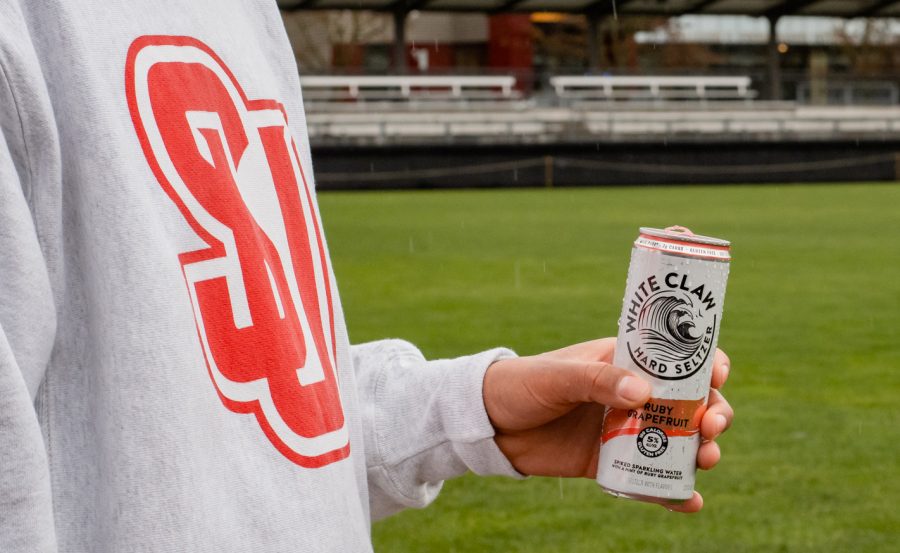Should Alcohol Be Sold at Seattle University Sports Games?
Alcohol may seem like a quintessential element of American sports, but Seattle University is among many universities that prohibit the sale of alcohol at sporting events. In Washington alone, neighboring public school, the University of Washington (UW), and fellow Jesuit college, Gonzaga University, allow the sale and consumption of alcoholic beverages at sporting events. Why doesn’t Seattle U do the same?
According to a poll from Lines, approximately 41% of viewers or attendees at NCAA events consume some sort of alcohol. The opportunity for Seattle U to sell alcoholic beverages could potentially increase revenue for the athletics program and help foster a more significant sporting culture at Seattle U.
The only access at Seattle U’s games is limited to a VIP section, usually reserved for alumni, where people attending have the option to purchase beer and wine for a higher ticket price. Seattle U, which does not have the same turnout at sporting events as its fellow Jesuit university in Washington State, could provide a new incentive to attend games through the sale of alcohol, which has a close connection with American sporting events.
Seattle U doesn’t have a formal policy on whether or not alcohol should be sold at games. Twenty-one year old Communications major Niko Constan thinks alcohol consumption could bring more energy to Seattle U sporting events.
“I think you get more of an audience [with alcoholic drinks being sold]. The crowd would be way more involved and go wild at pretty much every game. I think that allowing the sales would definitely help create a [sporting] culture,” Constan said.
If Seattle U began to sell alcohol at sporting events, it would present some logistical challenges. Washington State law includes a complex matrix of laws around the handling and sale of alcohol.
These constraints make it a difficult decision for any athletics department to consider the sale of alcohol. Alex Rider, the assistant athletic director for marketing and fan experience at Seattle U, sees both sides of the issue.
“There’s definitely some pros and cons,” Rider said. “Especially talking about space. Spills are a big piece of it. The number one priority is the student-athlete experience – making sure it’s a great one, and that also goes for our staff, making sure they have a good, safe clean environment.”
However, many other Western Athletic Conference (WAC) programs sell alcohol at games, and since 2019, UW has been able to sell alcohol at sporting events. UW’s policy states that “Alcoholic beverages may be served or sold at on-campus events if appropriate procedures and laws are followed.” These laws include the drinking age, alcohol service approval for staff and proper licensing. In the future, serving alcohol at Seattle U is not out of the question. However, Maria Uriarte, the associate athletic director for facilities and operations at Seattle U, pointed out that the licensing process is not brief or simple.
“It’s a little bit different by state, but the State of Washington requires a minimum of 45 days to request a liquor license. If we were to request it, I’m sure we would do something far in advance, and we’d do it for the year, and it would probably be for more than just basketball,” Uriarte said.
Attendance rates across the board were negatively influenced by the pandemic, with many fans finding it easier and cheaper to watch sports at home. Seattle U considered selling alcohol at sporting events, but such considerations were interrupted by the pandemic. Sarah Finney, associate athletic director for strategic communications at Seattle U, asserts that it is no longer a major focus so soon after the pandemic.
“It’s not a dry campus or anything like that. Pre-pandemic…it was something that we had brought up, and it was right around when UW made their change,” Finney said. “The conversation just kind of got halted at the time. Suddenly, we didn’t have events and then we didn’t have fans at events. It just hasn’t been a priority to focus on.”
While it can pose safety hazards, alcohol sales could be the future of college sports if state regulators and athletics administrations continue to hold an open position toward alcohol at sporting events. Potentially bringing in more revenue, ticket sales and exciting energy may incentivize Seattle U to sell alcohol at sporting events in the future.


